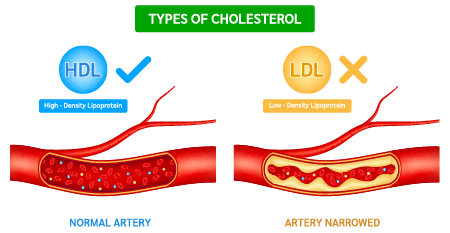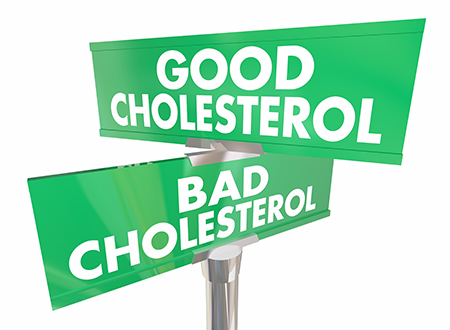Cholesterol
Cholesterol is primarily found in our diet such as milk, butter, meat, cheese, nuts, eggs, etc. Consuming these in moderate amounts is beneficial to the body. The South Asian diet is inherently rich in cholesterol, thereby increasing the risk of developing life-threatening complications.
Complications
Consuming high cholesterol containing food can cause a buildup of fat in our arteries and around our organs. This can lead to serious diseases such as heart attack and stroke.
What are Healthy Cholesterol Levels?
- Total cholesterol: less than 200mg/dL
- Low density lipoprotein cholesterol [LDL (bad)]: less than 100mg/dL
- High density lipoprotein cholesterol [HDL (good)]: 40mg/dL or higher
- Triglycerides (TGL): less than 150 mg/dL
- An ideal lab result would be a low LDL, high HDL, and normal TGL.
Due to the higher risk of developing heart disease in South Asians, it is recommended for physicians to use a lower threshold when determining a management plan.

How is High Cholesterol Diagnosed?
There are no obvious symptoms of high cholesterol. Every adult should be screened to prevent serious health complications. Screening involves a simple fasting blood test.
- If there is a significant family history of heart disease and stroke, screen children ages 9-11 and again at age 17-21
- All adults should be screened at least once and then every 4-6 years, depending on associated health conditions
What Are the Risk Factors for Developing High Cholesterol?
- Diet
- Obesity (BMI higher than 23 in South Asians)
- Age: risk increases after age 45 in men and age 55 in women
- Family history of heart disease and stroke
- High blood pressure
- Diabetes
- Lack of physical activity
- Inherited conditions where cholesterol may be 2-3 times higher than normal
Prevention & Treatment
GOAL: reduce LDL and increase HDL
- Your doctor will make recommendations for treatment based on your health condition and lab results
- Lifestyle modifications: Sometimes adjusting your diet and exercise can be enough to control your cholesterol numbers
- Low fat diet (reduce saturated fat to less than 7%)
- Lose weight
- Exercise at least 150 minutes per week
- Medications: If lifestyle modifications are not enough, your doctor will prescribe medications to reduce LDL and TGL:
- Type of drugs: Statins, bile acid sequestrants, fibrates, niacin
- You must remember to take these medications regularly, as directed by your doctor.

Consult your doctor before using any alternative therapies. Sometimes, even “natural” remedies can interact with your prescribed medications. DO NOT stop your medications without discussing with your doctor first!
___
References
- American College of Cardiology
- American Heart Association
- WHO statistics on Non-communicable disease
- CDC.gov
- El Camino South Asian Heart Center
